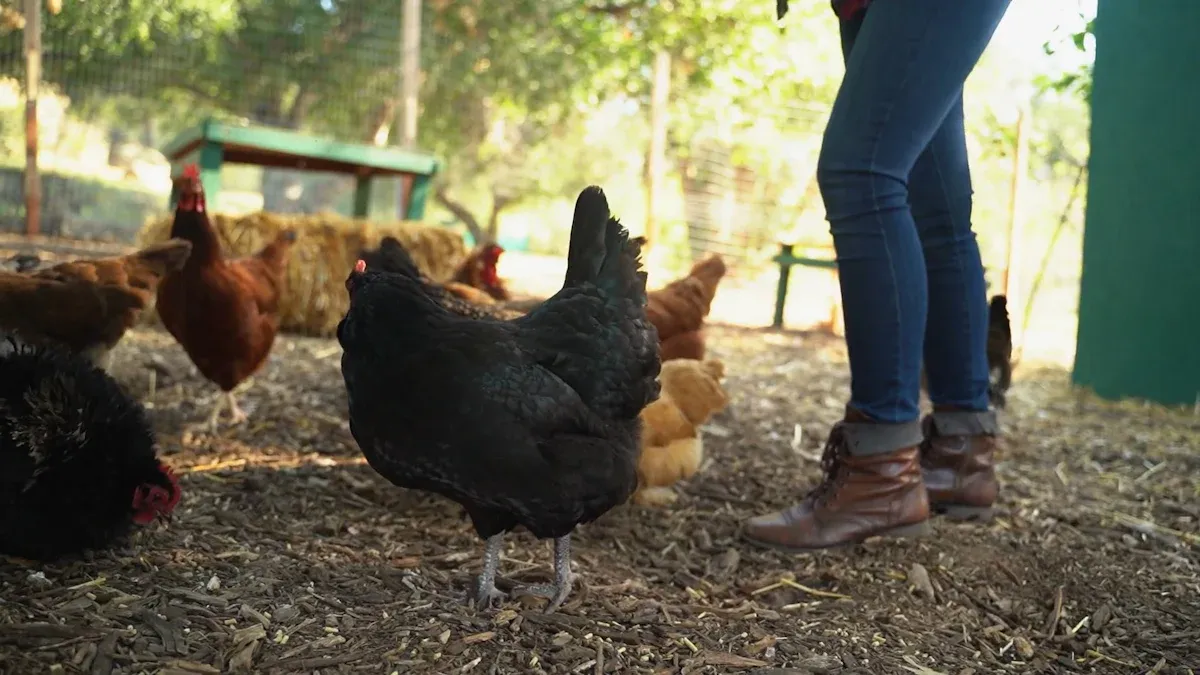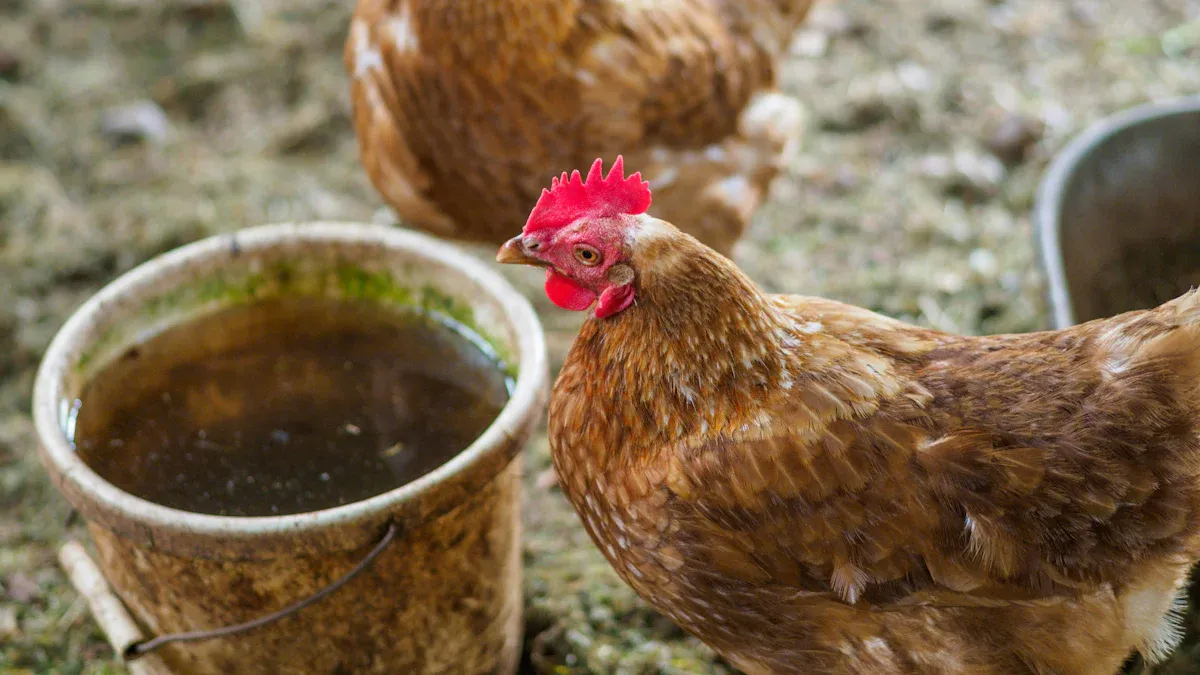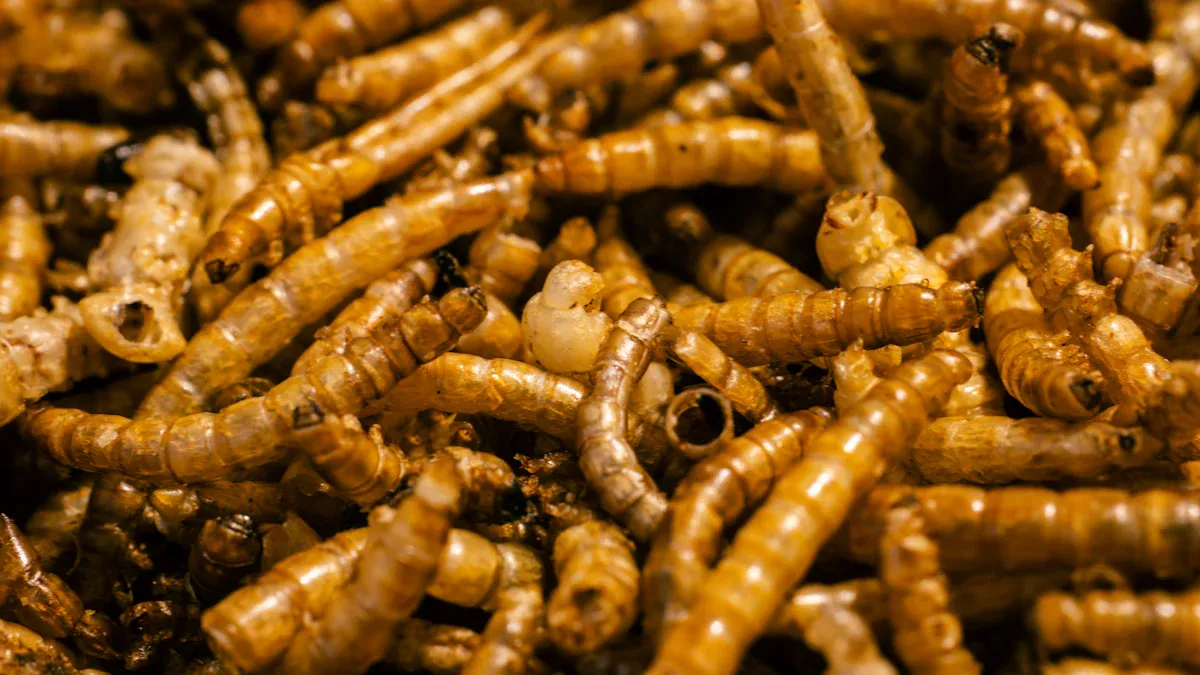
Mealworms are a fantastic treat for your flock. They’re packed with nutrients that help chickens thrive. For example, mealworms contain 19% protein (as-fed) and up to 55% when dried. They also provide 9% fat and 3% fiber, making them a great energy source. When chickens eat mealworms, they get a boost for growth, egg production, and overall health.
Key Takeaways
- Mealworms are a healthy snack for chickens. They give protein and important nutrients that help chickens grow, lay eggs, and stay healthy.
- Give mealworms in small amounts to keep chickens balanced. A small handful once or twice a week works well for five chickens.
- Buy good-quality mealworms from trusted sellers to keep them safe and nutritious. You can also grow your own for a greener choice.
Why Chickens Eat Mealworms: Nutritional Benefits

High Protein Content for Growth and Egg Production
Mealworms are a powerhouse of protein, which is vital for your chickens’ growth and egg production. Protein helps repair their bodies, supports feather development, and boosts their overall performance. Studies show that mealworm supplementation improves growth rates and feed efficiency in chickens. For example, research by Elahi et al. (2022) found that adding mealworms to chicken feed increased growth performance and feed conversion ratios.
| Study | Findings |
|---|---|
| Elahi et al. (2022) | Increased growth performance and feed conversion ratio in broilers. |
| Biasato et al. (2018) | 5-15% mealworm replacement of soybean meal led to higher body weight. |
| Ballitoc and Sun (2013) | Broilers fed 0.5-10% mealworms showed improved weight gain and feed use. |
When chickens eat mealworms, they also produce eggs with darker yolks and better nutritional quality. This makes mealworms a fantastic addition to their diet, especially if you want healthier eggs.
Essential Nutrients for Overall Health
Mealworms don’t just provide protein—they’re packed with other essential nutrients too. They contain healthy fats for energy, fiber for digestion, and vitamins that strengthen your chickens’ immune systems. These nutrients help your flock fight off diseases and stay active. When you feed mealworms, you’re giving your chickens a natural boost that keeps them thriving.
팁: A small handful of mealworms can go a long way in improving your chickens’ health. Just remember to feed them in moderation!
Encouraging Natural Foraging Behavior
Chickens love to forage, and mealworms are perfect for encouraging this natural behavior. Toss a few mealworms into their run, and watch them scratch, peck, and hunt for their treat. This activity keeps them mentally stimulated and physically active. It’s not just about nutrition—it’s about keeping your chickens happy and engaged.
When chickens eat mealworms, they’re not just getting a tasty snack. They’re also enjoying an experience that mimics their natural instincts. This makes mealworms a win-win for both their health and happiness.
Safety Tips for Feeding Mealworms
Importance of Moderation in Feeding
Mealworms are a great treat, but you need to feed them in moderation. Think of them as candy for your chickens—delicious and nutritious but not something they should eat all the time. Too many mealworms can upset the balance of their diet. Chickens need a variety of foods to stay healthy, and mealworms should only make up a small portion of their overall intake.
A good rule of thumb is to offer mealworms as a treat, not a staple. For example, a small handful of dried mealworms for a flock of five chickens once or twice a week is plenty. This way, your chickens get the benefits without overloading on protein or fat.
팁: Always pair mealworms with a balanced feed to ensure your chickens get all the nutrients they need.
Risks of Overfeeding and Nutritional Imbalances
Overfeeding mealworms can lead to serious problems. Chickens that eat too many mealworms may develop nutritional imbalances. High protein levels can strain their kidneys, while excess fat might cause obesity. These issues can affect their egg production and overall health.
You should also watch for signs of overfeeding, like reduced appetite for their regular feed or weight gain. If you notice these, cut back on the mealworms and focus on their primary diet.
Legal Considerations for Feeding Mealworms
Before you start feeding mealworms, check your local regulations. In some areas, feeding certain types of mealworms to chickens might be restricted. This is especially true if the mealworms are not farmed under strict safety standards.
Always source your mealworms from reputable suppliers to avoid any legal or health issues. If you’re unsure, contact your local agricultural authority for guidance.
How to Feed Mealworms to Chickens

Recommended Portion Sizes and Frequency
When it comes to feeding mealworms, portion control is key. You don’t want to overdo it, as mealworms are a treat, not a main course. For a small flock of five chickens, a handful of dried mealworms once or twice a week works perfectly. If you’re feeding fresh or live mealworms, adjust the amount to match their size.
A good rule of thumb is to keep treats, including mealworms, to about 10% of your chickens’ overall diet. This ensures they still eat their regular feed, which provides the balanced nutrition they need.
팁: Start with smaller portions if you’re introducing mealworms for the first time. This helps your chickens adjust to the new treat.
Best Times to Feed Mealworms
Timing matters when you feed mealworms. The best time is during the day, after your chickens have had their regular feed. This way, they won’t fill up on treats and skip their main meal.
Mealworms also work great as a reward. Use them to train your chickens or encourage them to return to the coop in the evening. Tossing a few mealworms into their run can also keep them entertained during the afternoon.
Adjusting Mealworm Intake During Special Conditions
Sometimes, your chickens might need a little extra protein. During molting, for example, they lose feathers and need more nutrients to grow them back. Increasing mealworm portions slightly during this time can help.
In colder months, mealworms provide an energy boost to help your chickens stay warm. However, always monitor their overall diet to avoid overfeeding.
참고 : If your chickens eat mealworms during these special conditions, make sure to balance their intake with other high-quality feeds.
Sourcing Mealworms for Your Flock
Buying Mealworms: Fresh, Dried, or Frozen Options
When it comes to buying mealworms, you’ve got a few options: fresh, dried, or frozen. Each type has its perks, so it’s all about what works best for you and your flock. Fresh or live mealworms are great if you want to encourage natural foraging. Chickens love chasing them around, and it’s a fun way to keep them active.
Dried mealworms are super convenient. They’re easy to store, last longer, and don’t require any special care. Plus, they’re just as nutritious as fresh ones. Frozen mealworms are another option. They’re a good middle ground—nutritious like fresh ones but easier to store.
팁: Always check the packaging for quality certifications. Look for mealworms labeled as safe for animal feed to avoid any health risks.
Growing Mealworms at Home for Sustainability
If you’re looking for a sustainable option, why not grow your own mealworms? It’s easier than you think and can save you money in the long run. All you need is a container, some wheat bran or oats, and a few starter mealworms. Keep them in a warm, dry spot, and they’ll multiply in no time.
Raising mealworms at home gives you full control over their diet and living conditions. This ensures they’re safe and healthy for your chickens. Plus, it’s a great way to reduce waste since mealworms can eat vegetable scraps.
Ensuring Quality and Safety of Mealworms
Quality matters when feeding mealworms to your chickens. Poorly reared mealworms can carry harmful microbes or lack proper nutrition. To ensure safety:
- Buy from reputable suppliers who follow strict farming standards.
- Check that the mealworms are free from mold or strange odors.
- Avoid mealworms raised in unsanitary conditions.
Studies show that rearing conditions directly impact the nutritional value and safety of mealworms. By sourcing high-quality mealworms, you’re giving your chickens the best possible treat.
참고 : If you’re unsure about a supplier, ask for details about their farming practices. It’s better to be safe than sorry!
Mealworms are a fantastic treat for your chickens, but moderation is key. Keep portion sizes small and stick to local regulations to ensure safety.
팁: Always choose high-quality mealworms from trusted sources.
By following these steps, you’ll keep your flock healthy, happy, and thriving. 🐔
제품 정보
Can baby chicks eat mealworms?
Yes, but only in small amounts. Start with finely chopped mealworms to avoid choking. Always prioritize their starter feed for balanced nutrition.
How do I store dried mealworms?
Keep them in an airtight container in a cool, dry place. This prevents moisture and keeps them fresh longer.
팁: Refrigeration can extend their shelf life even further!
Are mealworms safe for chickens during molting?
Absolutely! Mealworms are rich in protein, which helps chickens regrow feathers faster. Just remember to adjust portions to avoid overfeeding.
🐔 Fun Fact: Chickens love mealworms even more during molting!


